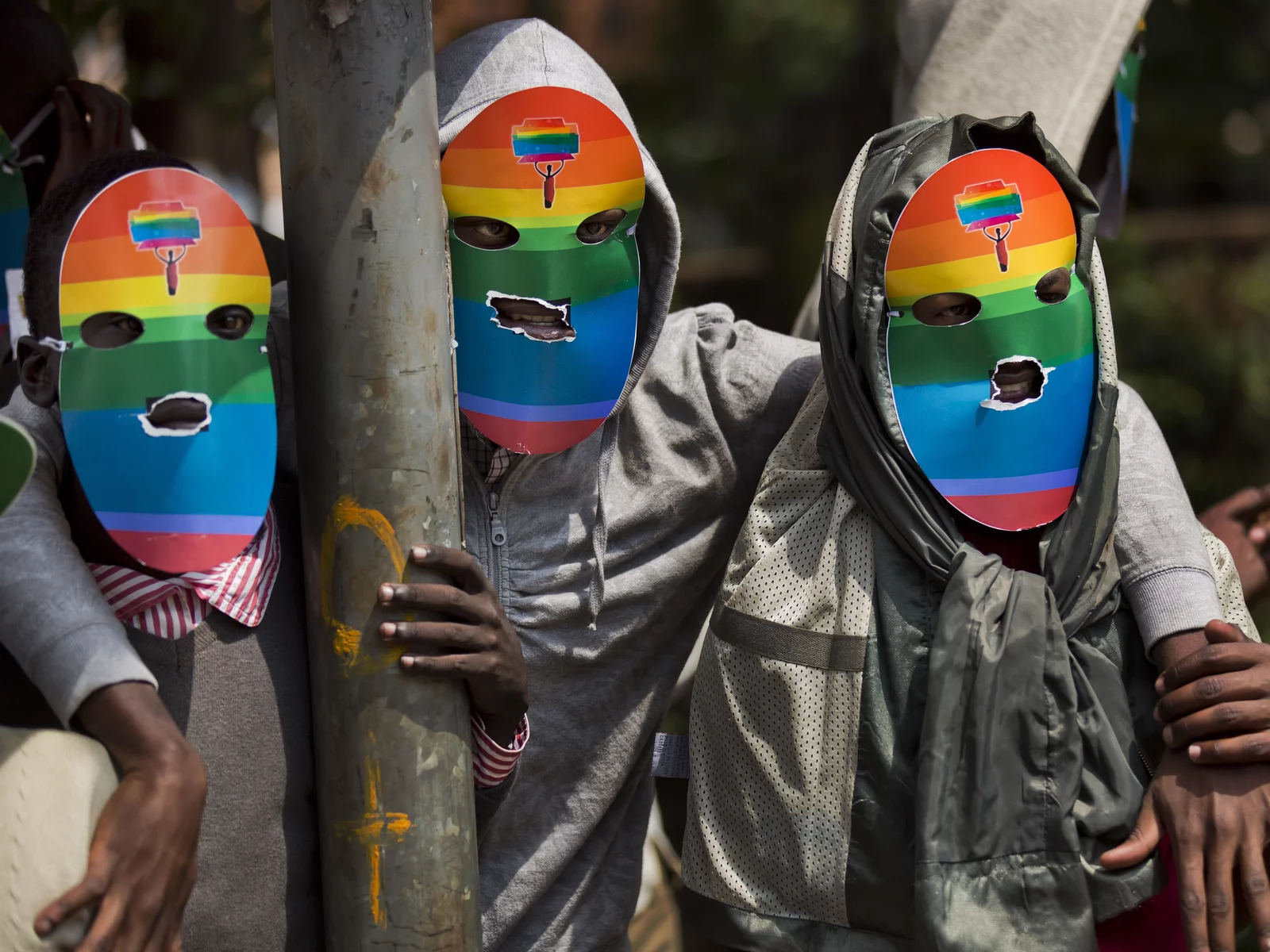Ugandan Parliament Passes Strict Anti-LGBTQ+ Laws
Protesters against the anti-LGBTQ+ bill stand outside the Ugandan High Commissions in Nairobi, Kenya wearing masks to keep their anonymity. Photo: Ben Curtis/AP
On Tuesday the Ugandan Parliament passed a set of anti-LGTBQ+ bills that would make gay relationships punishable by life in prison and in some cases, the death penalty. The anti-homosexuality laws, as they were named, are now some of the strictest anti-LGTBQ+ legislation in Africa.
The set of proposed laws would be the first in Africa that outlaws identifying as LGBTQ+. Gay sex is punishable by life in prison, as is “aggravated homosexuality”, which the Ugandan parliament defined as gay sex with people under the age of eighteen, or when one or both the partakers are HIV-positive. The “promotion of homosexuality” has also been deemed unlawful with a sentence of twenty or more years to anyone who openly supports the LGBTQ+ movement or donates money to related organizations.
The lawmakers in the Ugandan Parliament overwhelmingly supported the bill, passing it with little opposition. The supporters of the bill defended it by saying Uganda needs to punish the recent rise of LGBTQ+ activities in order to preserve the traditional, conservative, and religious values that Uganda stands by. David Bahati, a Ugandan lawmaker, stated during the debate on the bill, “Our creator God is happy [about] what is happening. ... I support the bill to protect the future of our children.”
The recent rise in support for anti-LGTBQ+ laws began with the arrests of people accused of recruiting children into “unnatural sexual practices.” The accusations included spreading ideas of homosexuality, gay relationships, pornography, among other charges. The religious and political leaders of Uganda claimed that students were being indoctrinated into homosexuality in schools.
Clare Byarugaba, LGBTQ+ Rights Activist from the Chapter Four Uganda, said in response to these claims that, “Whether you're heterosexual or homosexual, the government and parliament should introduce laws, or at least implement existing laws that protect all children - boys, girls from defilement. So the issue of recruitment has been unproven, it is baseless, it is biased.” Many activists in Uganda have come out with similar statements and support for the frightened LGBTQ+ community.
“You are either with us or you’re with the Western world,” stated Parliament Speaker Anita Among, an avid defender of the anti-gay laws. International outrage was ignited over the passing of the bill, with the U.N. High Commission for Human Rights calling the bill excessively harsh, urging President Yoweri Museveni of Uganda, who has long been opposed to LGBTQ+ rights, to not sign it into law. In a speech to the Parliament, President Museveni said, “Western countries should stop wasting the time of humanity by trying to impose their practices on other people.” John Kirby, the U.S. National Security Council spokesperson, warned Uganda of possible economic repercussions.
Uganda has a long history of prejudice against the LGBTQ+ community that began with colonial-era laws. In 2014, a similar bill to the 2023 anti-homosexuality bill was proposed but redrafted to impose lighter sentences for gay sex. The bill that passed on Tuesday reverses those redrafts from 2014. When calling for the veto of the 2023 bill, Oryem Nyeko, Ugandan Human Rights Watch researcher, said, “One of the most extreme features of this new bill is that it criminalizes people simply for being who they are as well as further infringing on the rights to privacy, and freedoms of expression and association that are already compromised in Uganda.”
Frank Mugisha, Ugandan LGBTQ+ advocate, said that the LGBTQ+ people of Uganda may face mob violence, and are living in fear. The Ugandan anti-homosexuality laws are the first in a series of recent strikes on LGBTQ+ people in East Africa. Kenya is following suit with talks about introducing similar bills to Uganda.


